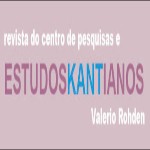"I THINK" AS FORM AND ACTION: KANT'S SELF BEYOND TIME AND SUBSTANCE
v. 3 n. 02 (2015) • Estudos Kantianos [EK]
Autor: Paulo JESUS
Resumo:
If permanence or abiding presence is a common quality shared by transcendental apperception and pure time, this does not imply that one should identify them, in accordance with Heidegger’s daimon, as connatural structures; instead, it might be more illuminating to uncover the underlying mediation that surpasses their original heterogeneity. This mediating role can be assigned to substance, conceived by Kant himself in a quite Leibnizian vein, as a self-founded force and, hence, an autonomous centre of ever-lasting activity. In a Kantian perspective, however, substance appears to be a fragile mediation, especially as one moves from the Lectures on Metaphysics of the 1770’s to the first Critique, in so far as an essential asymmetry emerges within this triadic community. Thus, whereas pure time and substance remain consistently linked—though space will tend to relate more immediately to substance than time—, the thinking self and its activity no longer signify the paradigmatic expression of real substantiality and real duration but “only a substance in Idea”. Located beyond time and substance, the I think comes to a sort of inner instability oscillating between static timelessness and dynamic production of time, pure self-representation and pure self-(re) presenting activity, logical form and logical act, transcendental unity and actual unification. Indeed, how can Myself “function as if” I were a substance without being so and, consequently, without being incorporated into a mere form? In other terms, how is one to grasp “activity” without using the idiom of substance and, at the same time, without inactivating it? Form and act must be envisaged, respectively, as the reduced and realized states of the same process, that is, mind or self in its determining motion.
Texto Completo: http://www2.marilia.unesp.br/revistas/index.php/ek/article/view/5651

Estudos Kantianos [EK]
Revista do Centro de Pesquisa e Estudos Kantianos Valério Rohden
